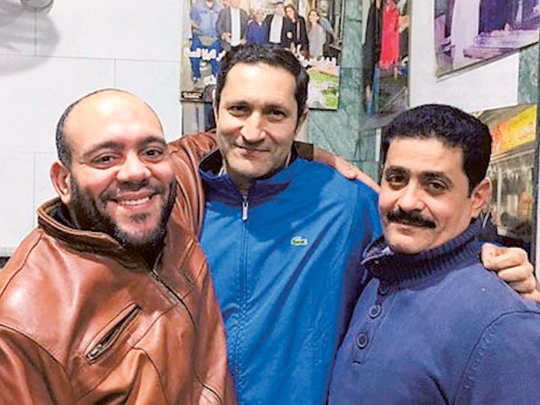
Cairo: Last week, restaurant patrons in Cairo’s working-class district of Al Sayeda Zainab were shocked when Alaa Mubarak, the eldest son of Egypt’s toppled president Hosni Mubarak, showed up without bodyguards.
Some rushed to take selfies with Alaa, who looked happy to grant their wish, according to media reports.
The 55-year-old businessman, wearing a track suit, had dinner at the eatery and then left. Soon, the photos went viral online, triggering an uproar.
The exact date of the visit was not known, but it was reportedly made last week.
Alaa’s showing up at the little-known restaurant was the latest in a series of appearances in public places by him and his 53-year-old brother Jamal since they were released from prison in late 2015. Both are being tried in a fraud case linked to alleged insider trading.
The two, along their father, have already served a three-year jail sentence each in a separate case after they were convicted of embezzling state money originally allocated for renovating presidential palaces when Mubarak the senior was in power.
In the final years of Mubarak’s rule, Jamal was widely rumoured to have been groomed to succeed his father in power, an allegation repeatedly denied by the family.
Last month, Alaa and Jamal attended a friendly football match between Egypt and Tunisia in Cairo.
Photos of Alaa celebrating Egypt’s win over Burkina Faso in the Africa Cup of Nations that ended last week in Gabon have also emerged.
The Mubarak sons also showed up several times to offer condolences on the death of public figures.
There has been no official comment on their public appearances.
However, a security source, speaking on condition of anonymity, said there are no legal restrictions on their movements.
Each time the Mubarak sons were seen in public, they received warm welcome in a sharp contrast to outpourings of hostile feelings against them and their family during and following the 2011 uprising that forced their father to step down after nearly 30 years in power.
However, more than six years later, anti-Mubarak sentiment still grips some Egyptians.
“At this particular moment, the January [2011] revolution is experiencing a very harsh defeat,” said Amr Badr, an outspoken critic of the Mubarak regime.
“This defeat allows thieves, the corrupt and autocrats to stick out their tongues and tell people that they exist and return,” Badr, editor of the opposition news portal Yanair (January) Gate, added in a Facebook post.
Agreeing, Ramy Welson, an online critic, tweeted: “We [Egyptians] are good-hearted folks. People are happy because they had the chance to chat with him [Alaa]. They forgot that they [Mubaraks] seized their money.”
Mubarak loyalists have lashed back.
“Mubarak was a great leader who did not implicate Egypt in wars and did a lot of good things to this country. People had better lives in his days,” Fouad Hesham, a store keeper in Cairo, said.
“Mubarak’s sons are well-bred and modest. The so-called revolutionaries know nothing. They are so conceited that they don’t want to admit the destruction they have caused to this country.”
The Egyptian economy has declined due to the upheaval that followed the revolt against Mubarak.
In recent months, Egyptians have suffered from shortages of staples and a spate of price rises blamed on the government’s free flotation of the local pound and cuts in subsidy on fuel.
Mubarak, 88, is staying at a military hospital in southern Cairo where he is being treated for age-related diseases.
Egypt’s top appeals court is due next month to rule in a final trial of Mubarak on charges of involvement in the killing of hundreds of protesters during the 2011 uprising.












